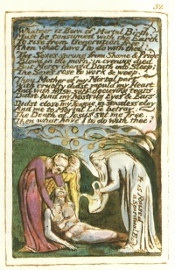Songs of Innocence and Experience Contents
- Social / political context
- Religious / philosophical context
- Literary context
- Textual history
- Songs of Innocence
- Introduction (I)
- The Shepherd
- The Ecchoing Green
- The Lamb
- The little black boy
- The Blossom
- The chimney sweeper (I)
- The little boy lost (I)
- The Little Boy Found
- Laughing song
- A Cradle Song
- The Divine Image
- Holy Thursday (I)
- Night
- Spring
- Nurse's Song (I)
- Infant Joy
- A Dream
- On Another's Sorrow
- Songs of Experience
- Introduction (E)
- Earth's Answer
- The Clod and the Pebble
- Holy Thursday (E)
- The Little Girl Lost
- The Little Girl Found
- The Chimney Sweeper (E)
- Nurse's Song (E)
- The Sick Rose
- The Fly
- The Angel
- The Tyger
- My Pretty Rose-tree
- Ah! Sun-flower
- The Lilly
- The Garden of Love
- The Little Vagabond
- London
- The Human Abstract
- Infant Sorrow
- A Poison Tree
- A Little Boy Lost (E)
- A Little Girl Lost
- To Tirzah
- The Schoolboy
- The Voice of the Ancient Bard
- A Divine Image
To TirZah - Synopsis and commentary
Synopsis of To Tirzah

The speaker addresses Tirzah, mother of the mortal body and its five senses:
- Whatever is purely material has first to die before it can freely exist – and be free from its association with Tirzah
- This is true of divided humanity, which is now able to live beyond the grave due to the mercy of Christ
- Tirzah is mother of the senses and has cruelly bound them in materiality and mortal flesh
- This would deceive the poem's speaker about the nature of reality so that s/he perceived only his/her mortal life. However, the death of Jesus has freed the speaker from this state and from subjection to Tirzah.
Commentary
This poem was not included in the original sequence of Songs of Innocence and Experience but added twelve years later. It is considered one of the most difficult poems in the collection and most critics would say it is impossible to be absolutely sure of its meaning. Do not worry, therefore, if it puzzles you!
Two views of humanity
Any commentary and interpretation depends upon how Blake's mythology and the symbolism it employed are understood. In general terms, Blake is contrasting two views of human life:
- That there is life beyond what one can see and touch. That humans have a soul and imagination and, through the work of Christ, are able to access the spiritual reality of their immortal life (eternal life beyond the grave).
- That the material world is all there is. That humans are merely mortal / earth-bound, and governed only by their senses, which therefore limit what they are able to understand / experience.
The first view is allied to the teachings of conventional Christianity. The latter view is represented by the symbolic figure of Tirzah.
Tirzah
In Blake's invented mythology, Tirzah is named after two instances in the Bible:
- Tirzah is one of five daughters who asked for a change in Israelite law so that females could inherit their father's property (Numbers 27:1-6). This became a legal precedent, so that each of the twelve Jewish tribes was bound to their land allocation in perpetuity.
- Tirzah is also the name of the first capital city of the Southern Kingdom of Israel, after the Northern Kingdom of Judah (which contained Jerusalem) split from it. It was the home of various Israelite kings who were renowned for their wrongdoing and who opposed the rulers from Jerusalem. Ultimately, this Southern Kingdom was overrun by invaders and erased from history, whereas Judah was re-established after conquest and survived as the home of God's people in the Old Testament. Its capital, Jerusalem, contained the Temple in which the presence of God was believed to reside.
Blake's female figure of Tirzah was, therefore, associated with mortality and a life bound by the limitations of the senses and the material world. She stands in opposition to Jerusalem / God / the life of the soul and imagination.
The trap of physicality
The critic Northrop Frye explores Blake's mythology and symbolism in his book Fearful Symmetry:
- According to Frye, To Tirzah is about human dependence on the five senses, symbolised by the ‘Mother' figure. Since everyone is born subject to physicality and mortality, they are ‘passively dependent' on the ‘sense experience' that comes with being a body
- Blake is not denying the goodness of the body. What he is opposing is the human tendency to only relate to what is experienced through the senses, so giving no freedom and place to the imagination and soul
- If the world is judged and experienced only through the senses, reality is reduced to whatever can be described or measured by them
- Reliance on the senses is thus a trap which denies access to spiritual reality. Blake symbolises this entrapment as a cruel act of deception and betrayal perpetrated by the ‘Mother of my Mortal part'
- Instead, humanity needs to connect with the ‘truth' of the spiritual world through their imagination.
Investigating To Tirzah
- What do you find most puzzling about this poem?
- Are there any ideas or expressions that you recognise from other Blake poems?
- What do they suggest to you about the meaning of this poem?
- English Standard Version
- King James Version
